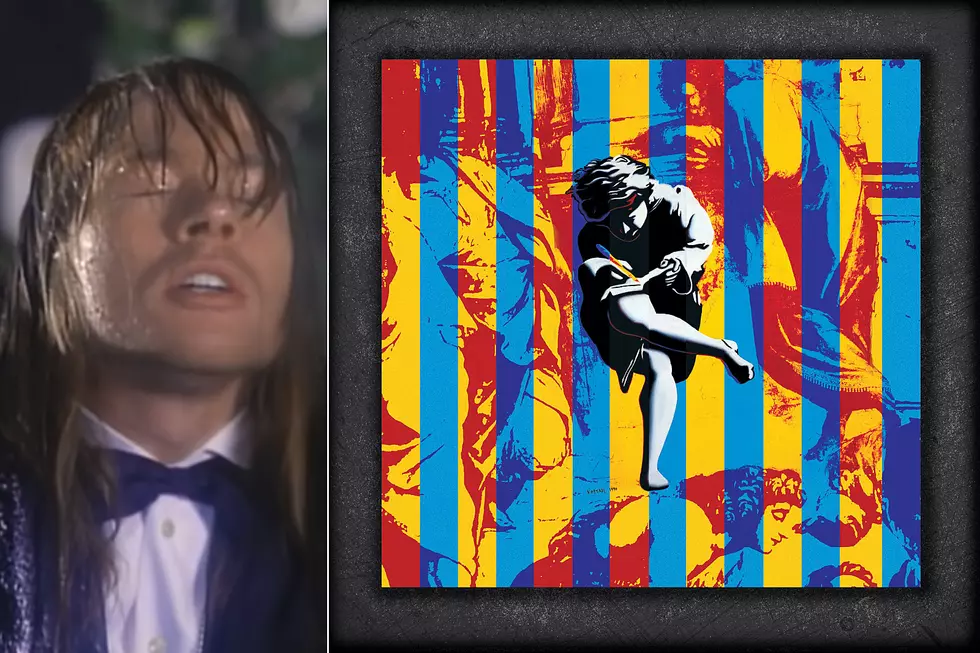
How Axl Rose’s Neighbor Inspired ‘Right Next Door to Hell’
Lest anybody think Guns N' Roses had gone soft in the four years since releasing their seminal debut, Appetite for Destruction, they kicked off their two-album Use Your Illusion set with the furious punk-metal ripper "Right Next Door to Hell," which found singer Axl Rose doing what he did best: settling scores in spectacularly petty fashion.
The first track on GNR's 30-song behemoth opens with Duff McKagan's bouncing bass line, followed by Slash's guitar-pick scrapes and explosive tom hits from new ironfisted drummer Matt Sorum. Slash then breaks into the song's freight-train lead riff, with Rose following closely behind, twisting himself into a corkscrew and unleashing a barrage of acid-tongued lyrics.
"Right next door to hell, why don't you write a letter to me? / I said I'm right next door to hell, and so many eyes are on me," Rose sings tauntingly in the choruses, teeing up Slash for a fleet-fingered solo with a full-throated "Fuuucccckkkkk yoooooouuuuuu, bitch!"
With so much fire and fury packed into a three-minute song, one might reasonably wonder, "Axl, who is all this vitriol for?"
You wouldn't have had to look far for the answer. Rose wrote "Right Next Door to Hell" (or at least the chorus) about his neighbor at the time, Gabriela Kantor, who accused the singer of clubbing her in the head with an empty wine bottle and throwing her car keys over his 12th-floor balcony on Oct. 30, 1990.
Rose, unsurprisingly, had a different version of events, telling police that Kantor had repeatedly harassed the singer since he moved into the luxurious West Hollywood condo. He said Kantor was blasting music in her apartment on the night of the arrest, prompting Rose to walk into the hallway and tell her to “shut up.” Kantor then allegedly hurled a wine bottle at him and threw her keys into his apartment.
“She was pounding on the door, trying to get in,” Rose told reporters following the arrest. “If she has any bruises, it was because she was throwing herself against the door. She was doing it to herself.”
Rose was arrested and charged with assault but released a few hours later on $5,000 bail. But he and Kantor continued to duke it out in an arena in which Rose had formidable experience: the press.
In a November 1990 People article, Kantor said she was experiencing “post-concussive syndrome" after being hit in the head with “a really good bottle” of Chardonnay. She also accused Rose, somewhat comically, of throwing a piece of chicken at her on the night of his arrest. In the same article, the singer described Kantor as an "obsessed fan," and accused her of calling his friends and family in Indiana, "telling them I’m shooting kids up with heroin and stuff like that. I don’t know what I represent to her. Gabby wants a big place in my life, and she can't take the rejection."
Listen to Guns N' Roses' 'Right Next Door to Hell'
In the same article, Rose hinted that his clashes with Kantor had inspired "Right Next Door to Hell," though fans wouldn't get to hear the finished product for 10 more months. It was one of several high-octane, venomous screeds on Use Your Illusion, which also found Rose taking shots at ex-girlfriends ("Back Off Bitch") and journalists whom he deemed unscrupulous ("Get in the Ring").
Use Your Illusion I and II debuted at Nos. 2 and 1 on the Billboard 200, respectively, and drew largely effusive praise from critics. But not everybody was impressed with the album's more acidic songs. "I thought they were tiresome, small-minded and mean," the band's then-manager Alan Niven said in Mick Wall's 2016 book, Last of the Giants.
Niven was well-versed in Rose's lyrical controversies, having weathered the backlash sparked by the racist and homophobic epithets the frontman lobbed on GN'R Lies track "One in a Million." "I'd backed him on that because I accepted his motivation was a sincere representation of his mindset at the time he was arriving [in L.A.]," Niven said. "But with the meanness and the vitriol — if you're going to apply it, apply it to something big. He'd make his attacks on his next-door neighbor or journalists, and I'm thinking, 'Axl, this is the scope of your world?'"
Niven's frustration stemmed partly from the fact that he understood the potential of Guns N' Roses' most poignant, musically urgent songs. "I had a band here of prodigious skill, spirit and intelligence," he told Wall. "When Axl played 'Civil War' for me, I was absolutely over the moon. The simple cleverness of saying, What's so civil about war? Clarity of expression. Great song. Then he plays me 'Right Next Door to Hell.'"
The 30 Wildest Moments From Guns N' Roses' Use Your Illusion Tour
More From 94.1 KRNA










